It is legitimate to say that Pessoa would never have existed without Lisbon, or that Lisbon would not be the same without Pessoa.
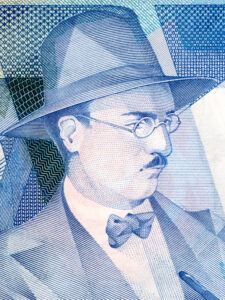
A lyric poet and a nationalist, he cultivated a form of poetry that focused on traditional Portuguese themes and its yearning and
nostalgic lyricism, expressing thoughts about his “inner self”, his anxieties, the solitude that assailed him and the states of tedious ness he suffered.
He was born in 1888, on the fourth floor of no. 4, Largo de São Carlos, Chiado – the area where, along with Baixa and Campo de Ourique, he would spend the most important moments in his life, a fact which would be repeatedly evidenced throughout his huge oeuvre.
Pessoa did not like travelling. The exception to the rule were the nine years he spent as a child in Durban, South Africa, where his stepfather was consul. The fact that he travelled little meant that he maintained an intimate relationship with his home city. Pessoa loved Lisbon and insisted that others saw it through the same eyes as he did.
He had no interest in a university degree, having attended only two years of the Faculty of Letters. As an autodidact, he turned the National Library into his second home, absorbing books on philosophy, religion, sociology and literature.
Although solitary by nature, with a limited social life and almost no love life, he was an active leader of Portugal’s Modernist movement in the 1910s.
A self-confessed loner, he devoted his life to words. He was a translator, advertising agent, editor, philosopher, playwright, essayist, astrologer… He founded Orpheu, with Mário de Sá-Carneiro, Raul Leal, Luís de Montalvor, Almada-Negreiros and the Brazilian Ronald de Carvalho.
Respected in Lisbon as an intellectual and a poet, he regularly published his work in magazines, several of which he helped to found and run, but his literary genius went largely unrecognized until after his death.
He wandered the streets of Lisbon between offices and cafés. In one of these offices he met Ophelia, the one and only love of his life. From the café A Brasileira, where he attended long soirées, he would walk down to Praça do Comércio to dine at Martinho da Arcada.
Although he also published poems under his own name, Pessoa employed more than 70 heteronyms, some of which were only discovered in the early 21st century. Four particular heteronyms stand out.
Three were “masters” of modern poetics and participated in lively dialogue through publications in critical journals about each other’s work: Alberto Caeiro, whose poems celebrate the creative process of nature; Álvaro de Campos, whose work was similar in both style and substance to the work of the American poet Walt Whitman; and Ricardo Reis, a Greek and Roman Classicist concerned with fate and destiny.
Another heteronym, Bernardo Soares, was the reputed author of Livro do desassossego (The Book of Disquiet), a diary-like work of poetic fragments that Pessoa worked on through the last two decades of his life and that remained unfinished at his death. It was published together for the first time in 1982 and brought him worldwide attention; a full English translation appeared in 2001.
Pessoa’s most important works in addition to Livro do desassossego are posthumously edited collections including Poesias de Fernando Pessoa (1942), Poesias de Álvaro de Campos (1944), Poemas de Alberto Caeiro (1946), Odes de Ricardo Reis (1946), Poesia, Alexander Search (1999), Quadras (2002), Poesia, 1918–1930 (2005), and Poesia, 1930 1935 (2006). Collections of his work in English translation include The Selected Prose of Fernando Pessoa (2001) and A Little Larger Than the Entire Universe: Selected Poems (2006), both edited and translated by Richard Zenith, and A Centenary Pessoa (1995).
One Pessoa, various heteronyms
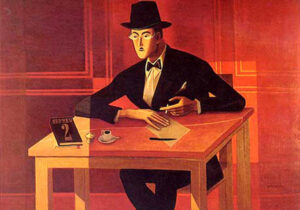
Fernando Pessoa was not one genius but several. Often confused with the word pseudonym – where different texts are written by the same writer under different names – Pessoa’s heteronyms are very different. They reveal his great mystery and are his greatest invention.
Even though around 70 names feature in his work, only Alberto Caeiro, Ricardo Reis and Álvaro de Campo are considered heteronyms. The fourth name, Bernardo Soares, is regarded as a semi-heteronym, since his personality contains very similar characteristics to those of the author.
WHO, THEN, ARE FERNANDO PESSOA’S HETERONYMS?
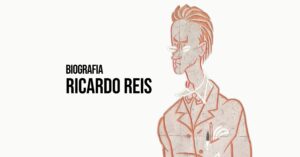
Born in Porto in 1887, the date of his birth is unknown. He studied medicine and, before that, at a Jesuit school. As a monarchist, he moved to Brazil in 1919 after the establishment of the republic in Portugal (1910). A learned doctor, his life is marked by classical culture and ancient Greek and Latin philosophy.
Ideals: man is not the master of his fate and cannot alter it. He must live it serenely (carpe diem) and try to be happy doing so.
Stylistic characteristics: classical language and scholarly vocabulary. The poetry is formally structured. Mythology and an awareness of fate is very present.
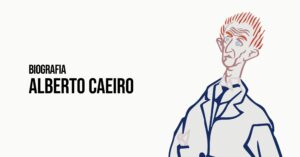
Born in Lisbon in 1889, Caeiro spent his life in rural Portugal and became an orphan at a very young age, going to live with his great aunt. Despite the date given for his death, there are poems by him that date from 1919. He died of tuberculosis.
Stylistic characteristics: the language of his poetry is simple, familiar and objective. Caeiro only went to primary school, after all.
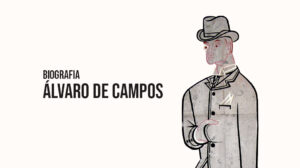
Born in Tavira in 1890, the date of his death is unknown. He studied to be an engineer in Scotland but never actually worked in the profession.
There are three different phases in the life of Álvaro de Campos – Decadent movement & Futurism & Nihilism.
